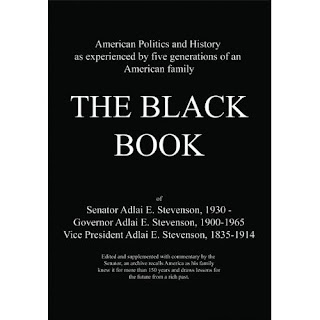My Interview with Adlai E. Stevenson III About Five Generations of Politicians and Statesmen
Posted on April 26, 2012 at 12:16 pm
I was lucky enough to interview former Illinois senator Adlai E. Stevenson III about his new book collecting the wisdom of five generations of his family for the wonderful Viral History blog from Ken Ackerman. Here is an excerpt:
Going back further, Senator Stevenson’s grandfather held state office in Illinois and his great-grandfather was a Congressman and Vice President of the United States under Grover Cleveland. His great-great-grandfather, Jesse Fell, was Secretary of the Illinois Republican Party. He proposed the historic Lincoln/Douglas debates and persuaded Lincoln to run for President. He did not run for office himself but set his family an example of citizen statesmanship that still resonates today.
Senator Stevenson is currently active through the Adlai Stevenson Center on Democracy, with an upcoming event on the Presidential Debates featuring my father, Newton Minow, whose work with Governor Stevenson during his Presidential campaigns in the 1950s formed the basis of the current system of Presidential debates.
NM: What has been the biggest change for the worse since you were in the Senate? What has been the biggest change for the better?
 AES: In the Senate I entered, there was no partisanship. We worked across the aisle – remember Nixon supported Environmental Protection, product safety, OSHA, even supported wage and price controls. The center was broad. Reason still reigned – and some wise men (yes, mostly men). Nowadays anybody can be elected without sufficient money or notoriety. The process is paralyzed. Civility broke down as ideology and money invaded. Now a handful can stop consideration of measures and paralyze Congress. I haven’t observed any favorable changes.
AES: In the Senate I entered, there was no partisanship. We worked across the aisle – remember Nixon supported Environmental Protection, product safety, OSHA, even supported wage and price controls. The center was broad. Reason still reigned – and some wise men (yes, mostly men). Nowadays anybody can be elected without sufficient money or notoriety. The process is paralyzed. Civility broke down as ideology and money invaded. Now a handful can stop consideration of measures and paralyze Congress. I haven’t observed any favorable changes.NM: Do you think there is any way to limit the impact of the Supreme Court’s Citizens Uniteddecision on corporate money in politics?
NM: There are a lot of wonderful quotes in the book. Did any of the selections collected by your father surprise you? Do you have a favorite?
AES: Remember, the quotations came from everywhere and were added over four generations, probably most by me. As I say, every page uncovers a surprise that I added for illustrative, not so much argumentative, purposes. (The open letter to Santorum was ahead of its time like others). I have many favorites, for example:
- ” With all the temptations and degradations that beset it, politics is the noblest career; any man can choose. Andrew Oliver, ca 1810.
- “Ever’ once in a while some feller with no bad habits gits caught,” Will Rogers.
- And my cardinal rule: A politician owes the public: “his conscience and his best opinion…not his industry only, but his judgment; and he betrays instead of serving you if he sacrifices it to your opinion.” Edmund Burke, 1774



One Reply to “My Interview with Adlai E. Stevenson III About Five Generations of Politicians and Statesmen”
Comments are closed.